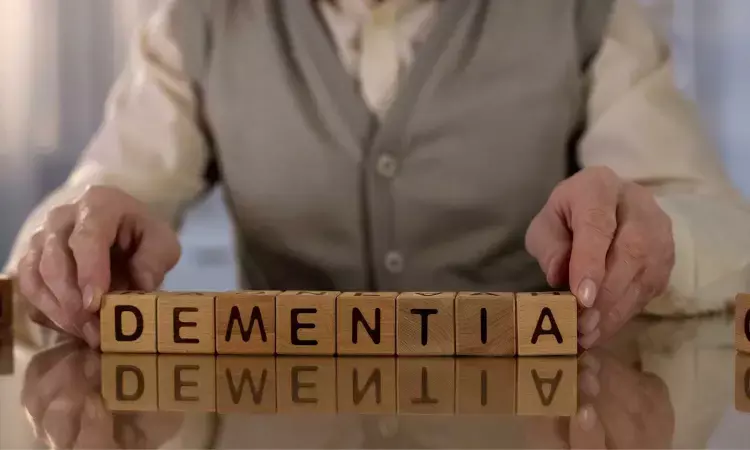- Home
- Medical news & Guidelines
- Anesthesiology
- Cardiology and CTVS
- Critical Care
- Dentistry
- Dermatology
- Diabetes and Endocrinology
- ENT
- Gastroenterology
- Medicine
- Nephrology
- Neurology
- Obstretics-Gynaecology
- Oncology
- Ophthalmology
- Orthopaedics
- Pediatrics-Neonatology
- Psychiatry
- Pulmonology
- Radiology
- Surgery
- Urology
- Laboratory Medicine
- Diet
- Nursing
- Paramedical
- Physiotherapy
- Health news
- Fact Check
- Bone Health Fact Check
- Brain Health Fact Check
- Cancer Related Fact Check
- Child Care Fact Check
- Dental and oral health fact check
- Diabetes and metabolic health fact check
- Diet and Nutrition Fact Check
- Eye and ENT Care Fact Check
- Fitness fact check
- Gut health fact check
- Heart health fact check
- Kidney health fact check
- Medical education fact check
- Men's health fact check
- Respiratory fact check
- Skin and hair care fact check
- Vaccine and Immunization fact check
- Women's health fact check
- AYUSH
- State News
- Andaman and Nicobar Islands
- Andhra Pradesh
- Arunachal Pradesh
- Assam
- Bihar
- Chandigarh
- Chattisgarh
- Dadra and Nagar Haveli
- Daman and Diu
- Delhi
- Goa
- Gujarat
- Haryana
- Himachal Pradesh
- Jammu & Kashmir
- Jharkhand
- Karnataka
- Kerala
- Ladakh
- Lakshadweep
- Madhya Pradesh
- Maharashtra
- Manipur
- Meghalaya
- Mizoram
- Nagaland
- Odisha
- Puducherry
- Punjab
- Rajasthan
- Sikkim
- Tamil Nadu
- Telangana
- Tripura
- Uttar Pradesh
- Uttrakhand
- West Bengal
- Medical Education
- Industry
Dementia takes 3.5 years to diagnose after symptoms begin: Study

People with dementia are diagnosed an average of 3.5 years after symptoms are first noticed, or even longer (4.1 years) for those with early-onset dementia, finds a new study led by UCL researchers.
The study, published in the International Journal of Geriatric Psychiatry, is the first systematic review and meta-analysis of global evidence examining time to diagnosis in dementia.
The researchers reviewed data from 13 previously published studies which took place in Europe, US, Australia and China, reporting data on 30,257 participants.
The research team was investigating the average interval between symptom onset (rated by patients or family carers using interviews or medical records) to the final diagnosis of dementia.
Lead author Dr Vasiliki Orgeta (UCL Division of Psychiatry) said: “Timely diagnosis of dementia remains a major global challenge, shaped by a complex set of factors, and specific healthcare strategies are urgently needed to improve it. Other studies estimate that only 50-65% of cases are ever diagnosed in high-income countries, with many countries having even lower diagnostic rates.
“Timely diagnosis can improve access to treatments and for some people prolong the time living with mild dementia before symptoms worsen.”
In a pooled meta-analysis of 10 of the included studies, the researchers found that it typically takes 3.5 years from the first alert of symptoms to a patient receiving a diagnosis of dementia, or 4.1 years for those with early-onset dementia, with some groups more likely to experience longer delays.
They found that younger age at onset and having frontotemporal dementia were both linked to longer time to diagnosis. While data on racial disparities was limited, one of the studies reviewed found that black patients tended to experience a longer delay before diagnosis.
Dr Orgeta said: “Our work highlights the need for a clear conceptual framework on time to diagnosis in dementia, developed in collaboration with people with dementia, their carers, and supporters.”
Dr Phuong Leung (UCL Division of Psychiatry) said: “Symptoms of dementia are often mistaken for normal ageing, while fear, stigma, and low public awareness can discourage people from seeking help.”
Professor Rafael Del-Pino-Casado, of the University of Jaén, Spain, said: “Within healthcare systems, inconsistent referral pathways, limited access to specialists, and under-resourced memory clinics can create further delays. For some, language differences or a lack of culturally appropriate assessment tools can make access to timely diagnosis even harder.”
Dr Orgeta added: “To speed up dementia diagnosis, we need action on multiple fronts. Public awareness campaigns can help improve understanding of early symptoms and reduce stigma, encouraging people to seek help sooner. Clinician training is critical to improve early recognition and referral, along with access to early intervention and individualised support so that people with dementia and their families can get the help they need.”
Reference:
Olubunmi Kusoro, Moïse Roche, Time to Diagnosis in Dementia: A Systematic Review With Meta-Analysis, International Journal of Geriatric Psychiatry, https://doi.org/10.1002/gps.70129
Dr Kamal Kant Kohli-MBBS, DTCD- a chest specialist with more than 30 years of practice and a flair for writing clinical articles, Dr Kamal Kant Kohli joined Medical Dialogues as a Chief Editor of Medical News. Besides writing articles, as an editor, he proofreads and verifies all the medical content published on Medical Dialogues including those coming from journals, studies,medical conferences,guidelines etc. Email: drkohli@medicaldialogues.in. Contact no. 011-43720751


